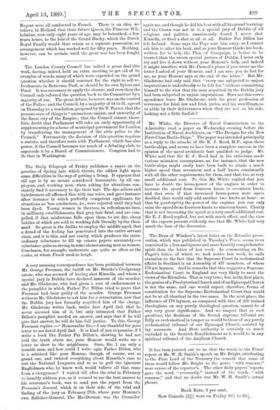The Dean of Windsor's latest letter on the Ritualist prose-
cution, which was published in Tuesday's Times, seems to us conceived in a less ambiguous and more heartily comprehensive spirit than the letter of last week. In commenting on Dr. Paget's letter, of which we took notice last week, he calls attention to the fact that the Supreme Court in ecclesiastical affairs in Scotland is an Assembly of 437 members, of whom 178 are laymen. And he remarks that this suggests a Supreme Ecclesiastical Court in England not very likely to meet the views of the Ritualists. That is very true ; but, in the first place, the genius of a Presbyterian Church and of an Episcopal Church is not the same, and one would expect, therefore, forms of constitution for the Supreme Ecclesiastical Court that would not be at all identical in the two cases. In the next place, the influence of 178 laymen, as compared with that of 259 trained theologians, on any purely theological question, cannot be of any very great significance. And we suspect that on such questions, the decisions of the Scotch supreme tribunal are fully as ecclesiastical in temper as would be those of any purely ecclesiastical tribunal of our Episcopal Church, assisted by lay assessors. And State authority is certainly as much excluded in the Scottish Establishment as it would be in any spiritual tribunal of the Anglican Church.


































 Previous page
Previous page